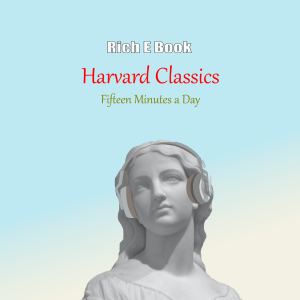
280.7K
Downloads
736
Episodes
Former President of Harvard University Charles W. Eliot wrote in his introduction to the Harvard Classics, "In my opinion, a five-foot shelf would hold books enough to give a liberal education to any one who would read them with devotion, even if he could spare but fifteen minutes a day for reading." Here you are, you can easily listen to his entire 15-minutes-a-day study guide while commuting to and from work (most of us spend far more than 15 minutes a day commuting each day), doing mundane work in the office, washing dishes at home, or doing most of the things day in and day out. It is so easy, so entertaining, and so educational that they can be listened to again and again, until they permeate into our own thinking and into our characters. Perhaps, in one year's time, you will become someone you barely recognize, all for the better. Who knows?
-- Rich E Book
Former President of Harvard University Charles W. Eliot wrote in his introduction to the Harvard Classics, "In my opinion, a five-foot shelf would hold books enough to give a liberal education to any one who would read them with devotion, even if he could spare but fifteen minutes a day for reading." Here you are, you can easily listen to his entire 15-minutes-a-day study guide while commuting to and from work (most of us spend far more than 15 minutes a day commuting each day), doing mundane work in the office, washing dishes at home, or doing most of the things day in and day out. It is so easy, so entertaining, and so educational that they can be listened to again and again, until they permeate into our own thinking and into our characters. Perhaps, in one year's time, you will become someone you barely recognize, all for the better. Who knows?
-- Rich E Book
Episodes

Wednesday Apr 20, 2022
Introductory Note: Lord Byron
Wednesday Apr 20, 2022
Wednesday Apr 20, 2022
Introductory note on Lord Byron (Wikipedia)

Wednesday Apr 20, 2022
Poems, by Lord Byron
Wednesday Apr 20, 2022
Wednesday Apr 20, 2022
England's romantic poet died while fighting against the Turks on the side of the Greeks. His poems, "The Isles of Greece" and "The Prisoner of Chillon," proclaim freedom. (Volume 41, Harvard Classics)
At Missolonghi, Greece, 37 guns honor Byron, April 20, 1824.

Tuesday Apr 19, 2022
Introductory Note: Ralph Waldo Emerson
Tuesday Apr 19, 2022
Tuesday Apr 19, 2022
Introductory note on Ralph Waldo Emerson (Volume 5, Harvard Classics)

Tuesday Apr 19, 2022
Concord Hymn, by Ralph Waldo Emerson
Tuesday Apr 19, 2022
Tuesday Apr 19, 2022
Dr. Eliot says of the opening stanza of the "Concord Hymn": "In twenty-eight words here are the whole scene and all the essential circumstances... what an accurate, moving, immortal description is this!" (Volume 42, Harvard Classics)
Battle of Concord fought April 19, 1775.

Monday Apr 18, 2022
Introductory Note: Miguel de Cervantes
Monday Apr 18, 2022
Monday Apr 18, 2022
Introductory note on Miguel de Cervantes (Volume 14, Harvard Classics)

Monday Apr 18, 2022
Don Quixote (Vol. 1, Part 1, Ch. 1-2), by Miguel de Cervantes Saavedra
Monday Apr 18, 2022
Monday Apr 18, 2022
Reading too many romances of knights and valorous deeds caused a poor Spanish gentleman to polish up his great-grandfather's armor, rechristen his old nag, and sally forth. "Don Quixote," besides holding a secure niche in literature as the work that quashed the romantic school of knight-errantry, is at the same time one of the most widely-read stories in the world. (Volume 14, Harvard Classics)
Cervantes receives the last sacraments April 18, 1616.

Sunday Apr 17, 2022
Introductory Note: Benjamin Franklin
Sunday Apr 17, 2022
Sunday Apr 17, 2022
Introductory note on Benjamin Franklin (Volume 1, Harvard Classics)

Sunday Apr 17, 2022
The Autobiography of Benjamin Franklin (Ch. 8), by Benjamin Franklin
Sunday Apr 17, 2022
Sunday Apr 17, 2022
In 1731 there were not many books in America. Franklin saw the need for more books and by house-to-house canvassing persuaded Philadelphians to aid him in founding a public library which to-day stands as a lasting memorial to Franklin. (Volume 1, Harvard Classics)
Benjamin Franklin died April 17, 1790.

Saturday Apr 16, 2022
Introductory Note: Dante Alighieri
Saturday Apr 16, 2022
Saturday Apr 16, 2022
Introductory note on Dante Alighieri (Volume 20, Harvard Classics)

Saturday Apr 16, 2022
The Divine Comedy (Inferno VIII-IX), by Dante Alighieri
Saturday Apr 16, 2022
Saturday Apr 16, 2022
The city of Dis, within the gates of Hell, was guarded by monsters and surrounded by a moat filled with the tormented. Dante, protected by Virgil, entered the forbidden city, and viewed sights never before seen by living man. (Volume 20, Harvard Classics)
Dante urges attack on the city of Florence, April 16, 1311.
